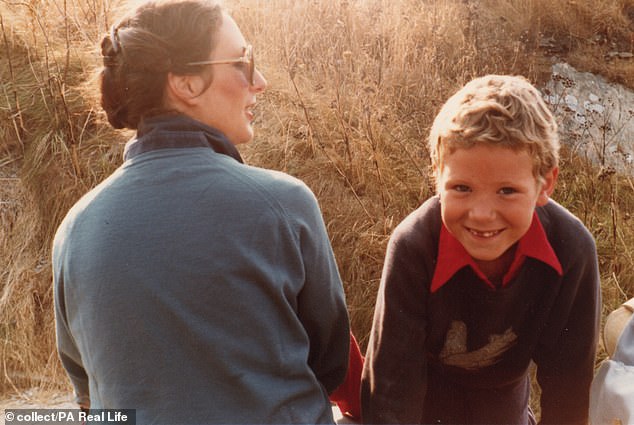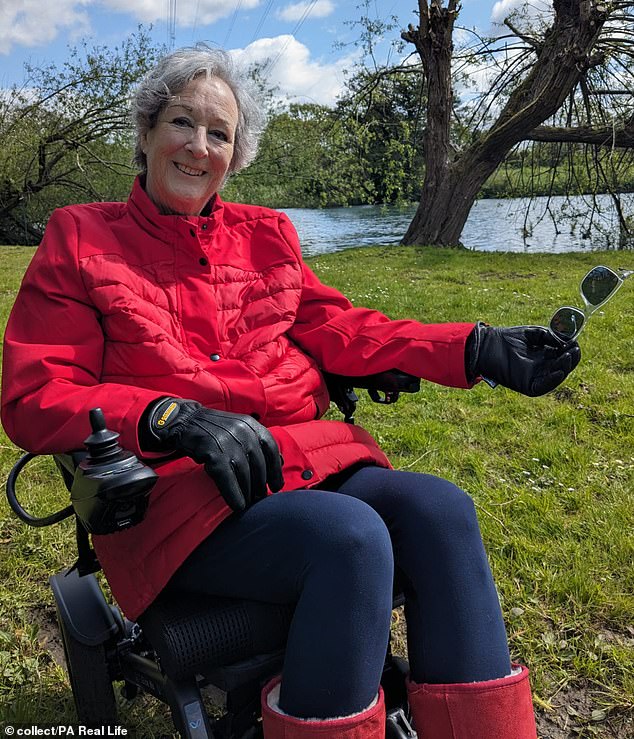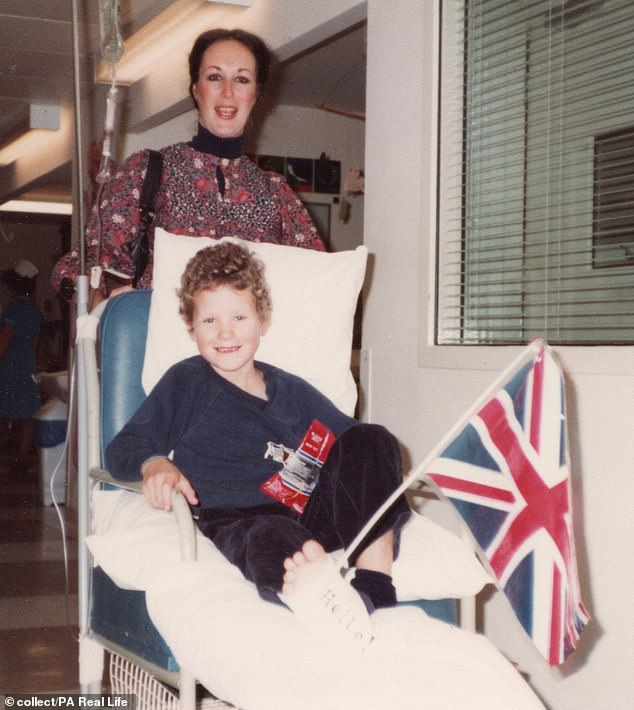Dying mother admits killing her terminally ill seven-year-old son with large dose of morphine to ‘quietly end his life’ after he told her ‘was in a lot of pain’ with stage 4 cancer
A dying mother has admitted killing her terminally ill seven-year-old son by giving him a large dose of morphine to ‘silently end his life’.
Antonya Cooper, from Abingdon, Oxfordshire, said her child Hamish had stage four cancer and endured “the most terrible suffering” before he died in 1981.
She said Hamish “told me he was in pain and asked me if I could take the pain away” and that as a mother she “wouldn’t let him suffer”.
The brave boy had been battling neuroblastoma, a rare form of cancer that affects children, since he was five years old and was told he had just three months to live.
And despite 16 months of ‘brutal’ cancer treatment at Great Ormond Street Hospital in London, Hamish’s incurable disease had left him in constant fear of death.
Of her decision to give her son a large dose of morphine, Mrs Cooper said: ‘It was the right thing to do. My son was going through the most horrific suffering and the most intense pain, I wasn’t going to put him through that.’
Mrs Cooper, who is also battling terminal cancer, describes in heartbreaking detail how she helped her son die after he begged her to ease his suffering.
Antonya Cooper, from Abingdon, Oxfordshire, said her son Hamish had stage four cancer and was in “a lot of pain” before he died in 1981.

Hamish suffered unimaginably and was in ‘intense pain’ during his battle with cancer, his mother said

Now battling terminal cancer herself, Mrs Cooper has spoken out about how she gave her son a ‘large dose’ of morphine to ‘quietly end his life’
“When Hamish said he was in a lot of pain last night I said, ‘Do you want me to take the pain away?’ and he said, ‘Yes please, Mum’,” Mrs Cooper told BBC Radio Oxford.
“And through his external Hickman catheter I gave him a large dose of morphine, which silently ended his life.”
BBC Radio Oxford asked the 77-year-old woman on her deathbed whether she believed her son knew she planned to take his life.
“I have a strong feeling that when Hamish told me he was in pain and asked me if I could take the pain away, he somehow knew what was going to happen,” she replied.
“But I can’t tell you exactly how or why, but I was his mother, he loved his mother and I loved him very much. I wasn’t going to let him suffer. I think he knew very well where he was going.”
Mrs Cooper makes this confession while campaigning for a change in the law surrounding euthanasia.
Assisted suicide (deliberately helping someone to end their life) and euthanasia (deliberately ending someone’s life) are both illegal in the UK.
Ms Cooper’s confession to the BBC could potentially expose her to a police investigation.
When asked if she understood that she might have confessed to manslaughter or murder, she told the radio station: “Yes.”

Patriotic Hamish, with a Union Jack on his hospital bed, endured 16 months of ‘brutal’ cancer treatment at Great Ormond Street Hospital after being diagnosed at the age of five
“When they come 43 years after the peaceful death of Hamish, I will have to face the consequences. But they will have to be quick, because I am dying too,” Mrs Cooper added.
Hamish died at home on December 1, 1981.
Antonya said the death of her beloved little boy felt like an “amputation” and that she “will never get over it”.
Ms Cooper has been diagnosed with terminal pancreatic cancer and is undergoing chemotherapy, which she says has left her feeling ‘awful’.
She now wants to campaign to change the laws surrounding euthanasia in the UK, joining people like Dame Esther Rantzen.
Dame Esther, best known for her role as presenter and producer of the popular BBC programme That’s Life!, has become one of the country’s highest-profile advocates for assisted suicide after being diagnosed with stage four lung cancer in January.
Last December, she announced that she had signed up with Dignitas, the most well-known assisted suicide clinic in Switzerland, and said that she “might move to Zurich” if her complex cancer treatment fails.
In England and Wales, assisted suicide is punishable by a maximum prison sentence of 14 years.
But despite the enormous personal risk, her daughter, Rebecca Wilcox, indicated she would help her mother get to a Dignitas clinic.
Wilcox, herself a TV presenter, wrote in Saga magazine: ‘If she goes – at the moment it would be her only option for euthanasia – she will have to go alone. It is against the law for me to accompany her. I would be prosecuted for manslaughter and could face up to 14 years in prison.

Despite the enormous personal risk, Rebecca Wilcox (pictured left) of Dame Esther Rantzen (pictured right) said she would help her mother attend a Dignitas clinic
‘Even if it doesn’t go to trial, many people face a two-year investigation. I have a young family with two children, a busy home and a complicated job. I shouldn’t have to risk going to prison to keep my mother company, but I’m not sure I could let her go alone.
‘It is an impossible decision to have to make: either risk persecution at the worst time in my life, having just lost my beloved mother, or do the unthinkable and let her die alone in a foreign country, without anyone she knows or loves to hold her hand.’
Wilcox added: ‘The thought of her actually dying is horrific, but the thought of her dying in pain is unthinkable.
“Her health is not great and her disease is not curable. The prognosis could be a painful death that cannot be alleviated with palliative care and opioid painkillers.”
Mrs Cooper is now dealing with her own terminal cancer, forty years after her son’s death.
She added: ‘I’m not religious, but there’s a little voice inside me that believes it would be great if I could hug Hamish one more time.’
